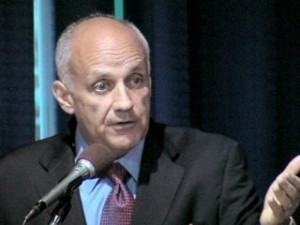Shocking Conflict Of Interest: Democratic Senate Candidate Richard Carmona Sits On The Board Of Taser International

Special interests don’t always get their way by just spending money on campaign contributions or lobbying. Sometimes these Big Money interests just directly have candidates for office on their payroll.
Richard Carmona is a former U.S. Surgeon General and sheriff running for the Arizona Democratic Party nomination for U.S. Senate. In recent weeks, there have been a number of interviews with and articles about Carmona focusing on his life story of being part of an immigrant family and growing up poor.
But Americans should know more about a candidate than their autobiography. In Carmona’s case, they should know that he is paid a healthy amount of money to sit on the boards of various corporations and to give speeches to other for-profit firms. The Hill pointed out in April that he’s made close to a million dollars last year from these activities.
He is also on the board of directors of Taser International — the leading manufacturer of stun guns — as an independent “director.” When Carmona joined the company, it put out a glowing press release bragging that the “17th United States Surgeon General” had joined its board of directors.
According to personal financial disclosures obtained by Republic Report from the U.S. Office of Public Records, Carmona’s Quarterly Directors Fees — logged as “Board Compensation” — for his board position for Taser International amounted to a whopping $42,500. Additionally, Carmona has access to a “Director Stock Option Plan” which includes 13,870 shares in the company “exercisable 1/4 on day before annual meeting at $7.21 per share,” according to the disclosures.
Carmona’s large payments from Taser International do not necessarily mean that he will govern in a way that benefits the company if he is elected, but these payments do represent a possible conflict on interest that the media should address when reporting about his candidacy, especially when criminal justice issues arise.